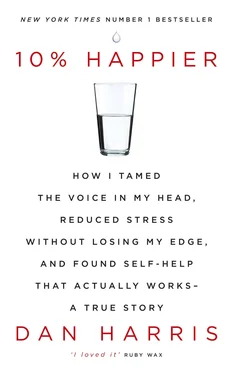It sounded like a remarkable group. They had all met at elite Northeast universities and also while taking exotic, druggy romps through the subcontinent. Mark theorized that many of these young Jewish people, having been raised in secular environments, felt a spiritual hole in their lives. He also acknowledged that the Jewish penchant for anxiety probably played a role in their collective attraction to Buddhism. Over the ensuing decades, the Jew-Bus had been a major force in figuring out how to translate the wisdom of the East for a Western audience—mostly by making it less hierarchical and devotional. Mark mentioned that he and some of his peers taught Buddhist-themed seminars around town, where they gave talks and answered questions. “Go to some events,” he advised, “until you get bored.”
I laughed. I liked this guy. This man whose picture I had reflexively rejected turned out to be somebody with whom I could see myself being friends. We were a bit of an odd pair, to be sure, but there was a certain compatibility, too. He was a professional listener; I was a professional talker. We both had the whole Boston–New York–Jewish cultural affinity thing. He didn’t feel foreign, like Tolle and Chopra. He could have been one of my uncles. I wanted to be his friend, but what I really wanted was to figure out how to get what he appeared to have. Not some self-conscious, allegedly unbreakable equanimity, but a quiet confidence, an easy charm. There was no denial of his neuroses; he seemed to find them amusing rather than enervating.
Normally at this point in the conversation—at least with a Tolle or a Chopra—I’d have been asking for practical advice and in return getting a blizzard of nonanswers. Mark, however, had a very explicit prescription. This is where the Buddhists diverged quite dramatically from self-help: They had an actual, practical program. It wasn’t expensive gimcrackery. No spendy seminars, no credit cards required. It was totally free. It was a radical internal jujitsu move that was supposed to allow you to face the asshole in your head directly, and peacefully disarm him. Problem was, I found what they were proposing to be repellent.
Chapter 6
The Power of Negative Thinking
My abiding distaste for anything associated with hippies or the New Age dates back to the mid-1970s when I was about five years old. My parents, still not having sloughed off the cultural residue of the Age of Aquarius, sent me to a children’s yoga class at a local elementary school. I showed up wearing Toughskins, the indestructible children’s jeans that had been recently introduced by Sears. The teacher, who looms in my memory like an airy-fairy praying mantis, pronounced my pants to be insufficiently flexible for the exercises we’d be doing. In front of all the other little kids, she made me strip down and do sun salutations in my tighty-whities.
My early childhood traumas—which also included compulsory camping trips and visits to musty health food stores—were compounded by my years at Colby College, a small liberal arts school in central Maine, where I was repeatedly forced to listen to Jerry Garcia’s interminable guitar noodling by hacky sack–playing, do-ragand Teva-wearing Deadheads from the suburbs of Massachusetts and Connecticut.
All of which left me in a tricky position vis-à-vis Buddhism. Epstein et al. argued that the only way to tame the monkey mind, to truly glimpse impermanence and defeat our habitual tendency toward clinging, was to meditate—and I had absolutely no intention of following their advice. Meditation struck me as the distillation of everything that sucked hardest about the granola lifestyle. I pictured myself seated in an unbearable cross-legged position (my disavowal of yoga having left me less limber than I would have liked) in a room that smelled like feet, with a group of smug “practitioners” ringing bells, ogling crystals, intoning om , and attempting to float off into some sort of cosmic goo. My attitude was summed up nicely by Alec Baldwin’s character on 30 Rock , who said, “Meditation is a waste of time, like learning French or kissing after sex.”
Compounding my resistance was my extremely limited attention span. (Another of the many reasons I went into TV.) I assumed there was no way my particular mind—whirring at best, at worst a whirlwind—could ever stop thinking.
This stalemate between the dharma and me might have dragged on indefinitely, but then a month after my man-date with Epstein, I happened to go see my shrink. I was reluctant to tell Dr. Brotman about my budding interest in Buddhism because, like me, he had an aversion to sloppy sentimentality; it’s part of why we were simpatico. But when I fessed up, he responded by telling me about a former colleague of his from Harvard who had written a bestselling book about the health benefits of meditation. Brotman seemed to think it might do me some good.
“Yeah, I’m pretty sure that’s not for me,” I said. Then, as I sat there absorbing his surprising response, I recalled aloud how, on the first day we met, he had used an animal analogy to explain how someone like me needed to not only refrain from drugs but also engage in careful mental and physical upkeep in order to stay balanced.
“When you say you think meditation might be good for me, is that because of the time you told me I needed to treat myself like a stallion?”
He started laughing and shaking his head. “I never said stallion. I said thoroughbred. ”
Whatever: semantics. I went ahead and read the book he was referring to by Brotman’s friend. The doctor’s theory was that, in modern life, our ancient fight-or-flight mechanism was being triggered too frequently—in traffic jams, meetings with our bosses, etc.—and that this was contributing to the epidemic of heart disease. Even if the confrontations were themselves minor, our bodies didn’t know that; they reacted as if they were in kill-or-be-killed scenarios, releasing toxic stress chemicals into the bloodstream. The doctor had done studies showing that meditation could reverse the effects of stress and lower blood pressure—which the hypochondriac in me found deeply appealing.
I then read a few books about what Buddhist meditation actually involved, and learned that you didn’t need to wear robes, chant Sanskrit phrases, or listen to Cat Stevens. Perhaps my attitude on this matter was yet another example of my reaching hasty conclusions. My resistance was starting to crack.
Saint Paul, the notorious murderer of Christians, had a conversion experience on the road to Damascus. Nixon, the devout anti-Communist, electrified the world by traveling to China. The sudden renunciation of everything one has previously stood for is a well-established part of the human repertoire. Mine came in a stolen moment on the floor of a beach house.
It was the last weekend in August, and Bianca and I were sharing a big, old, converted barn with a group of friends. The people we were leasing it from, a pair of retired college professors, had rather idiosyncratically decorated the place with antique farm equipment, including sickles, axes, and pitchforks, which were hanging precariously from the rafters and from pretty much every inch of wall space. In addition to the elaborate arrays of saws, scissors, and hammers, there was a barrel filled with wooden rakes.
One afternoon, I was out by the pool, after having just finished reading yet another book about Buddhist meditation. The thought popped into my head: Should I try this? I was in a weakened state. Tenderized by the scientific evidence, and with my reference points for normalcy scrambled by months of marinating in Buddhism, I decided: Damn it, let’s give it a shot. Carpe diem, and whatnot.
While my housemates clearly had a high tolerance for kitsch—given their willingness to live in a house named “Barn Again”—I was not at all sure they were open-minded about meditation, and I had no desire to find out. I sneaked off to our bedroom to give it a try.
Читать дальше












